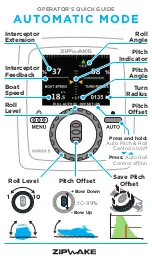
I s s u e 6 ( February 2 0 0 5 )
Technical Ser vice Manual
S m i t h s M e d i c a l
3 — 4
3
M S 1 6 A S y r i n g e D r i v e r
Note
:
The amount of overrun at each step, though indeterminate, is
non-cumulative. After 60 pulses the cam will have rotated
through ten revolutions plus the error of the last step.
Transistor TR4 and its associated components form an adjustable
current regulator which is pre-set to limit the torque of the motor
and therefore the maximum actuator thrust. Because the motor drive
pulses may be quite infrequent, a light emitting diode (
LED
) is driven
at a fixed frequency by IC1, pin 14. This provides a continuous check
on the functioning of the oscillator and the low battery indication (see
Low battery indication, page 3 - 5)
.
Primary guard
Whenever the motor is energised (i.e. whenever the node marked A
is held low), this is sensed at IC1, pin 22. If A is held low for more
than 3.7 seconds (896 cycles of the master-clock). the output from IC1,
pin 11 causes TR3 to switch off.
In normal use, the motor runs for less than 3.7 seconds, so the guard
circuit only operates when the motor is stalled (e.g. when the syringe
is empty or when the delivery line is occluded), if a transistor or the
cam-operated switch fails, or when the
START/TEST
pushbutton is
held depressed.
Secondary guard
If the main oscillator ever fails, the run time of the motor is limited
by a secondary guard circuit.
When the motor is energised, capacitor C2 acquires a charge via
resistor R4 (the charge is quickly dissipated at the end of the motor
drive pulse by diode D4).
If the motor attempts to run for longer than approximately 5 seconds,
the voltage on capacitor C2 (i.e. voltage at IC1, pin 9) falls to a critical
level, causing the output from IC1, pin 11 to switch off TR3.
The driver will fail safe (switch off), regardless of how A came to be
held low for longer than the normal operating pulse duration.
Switch-off alarm
The piezo-transducer (X1) and associated components (TR8, R18, R15,
R16) are arranged so that an alarm tone sounds when the bottom end
of R16 is held low. This occurs for a few seconds whenever TR3
switches off, owing to TR9 being turned on until C5 is charged via
R17.
SM0105-3-6.PMD
2/23/2005, 2:56 PM
4
Summary of Contents for Graseby MS16A
Page 13: ...1 Graseby MS16A Syringe Driver Chapter 1 Product Overview SM0105 1 6 PMD 2 23 2005 2 54 PM 1 ...
Page 50: ...6 Graseby MS16A Syringe Driver Chapter 6 Maintenance SM0105 6 6 PMD 2 23 2005 3 03 PM 1 ...
Page 55: ...7 Graseby MS16A Syringe Driver Chapter 7 Parts List SM0105 7 6 PMD 2 23 2005 2 59 PM 1 ...
















































